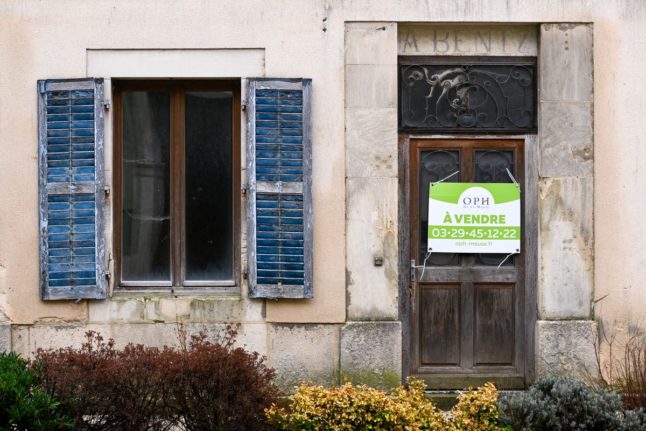The French government has several financial assistance schemes that are open to property owners to help finance renovation projects, especially those aimed at making homes more energy efficient.
GUIDE: French property grants you might be eligible for
Now a new one has been launched, aimed at property that is in a dilapidated and run-down state. The idea is both the ease the housing shortage that is a problem in several French cities and ensure that people are living in decent conditions.
Launched on January 1, 2024, Ma Prime Logement Décent (My Decent Housing Bonus) has enabled property owners to obtain financial assistance for renovation work on run-down housing.
Homeowners on a modest income can apply for the Ma Prime Logement Décent financial aid, which is – in certain cases – up to 80 percent of the total spent, up to a maximum of €70,000.
The scheme is open to people who own their own home and people who own a property that they rent out, but is not available to second home owners. You do not need to be a French national to apply, but you must be resident in France, have a French tax number and complete the annual French income tax declaration.
The aid can only be used for work to remedy a proven health or safety risk at a property, such as:
- unsanitary conditions;
- a risk of lead exposure;
- significant deterioration to a property’s fabric.
Work may include :
- renovating an electrical or gas network;
- replacing a roof;
- reinforcing the foundations.
Who’s eligible?
Owner-occupiers on ‘modest’ or ‘very modest’ incomes whose main residence requires renovation can apply for the Ma Prime Logement Décent aid, if:
- the property was built more than 15 years ago;
- the work is carried out by qualified professionals (except very particular cases);
- your home has been assessed by a qualified assessor.
After work has been completed, it must achieve a minimum energy efficiency rating of E.
READ ALSO What do energy ratings mean for French property owners?
Owners renting out their property can apply for this aid in the following circumstances.
- The unfurnished property must be rented to a low-income tenant, who cannot be a family member, or a member of the landlord’s household for tax purposes;
- The property has a capped rent – ceilings are defined annually by commune or arrondissement;
- It has at least a level D energy efficiency rating after the work has been carried out.
READ ALSO GUIDE: French property grants you might be eligible for
How much is the help worth?
When you use Ma Prime Logement Décent as an owner-occupier, you’ll be reimbursed for :
- 80 percent of the cost of the work if you’re part of a ‘very low income’ household (rising to 90 percent if the work also means that your home is no longer a so-called heat sieve);
- 60 percent of the cost of the work if you are part of a ‘low-income’ household ( rising to 70 percent if the work also prevents the home from becoming a so-called heat sieve).
In both cases, the total cost of the work must not exceed €70,000.
Owners renting out their property can benefit from 35 percent of the cost of your renovation work.
An online simulator can help property owners check whether the work qualifies for the Ma Prime Logement Décent scheme.
You use terms like ‘very low income’ and ‘low income’. What does that mean?
Your revenus fiscaux de référence (RFR) are important. You’ll see the figure on your annual tax assessment – it’s basically an amount calculated by the tax administration from the total income of a tax household intended to reflect the financial resources of that household.
It helps decide what social assistance you may be entitled to.
READ ALSO MaPrimeRenov: How France’s property renovation grants will change in 2024
In the greater Paris Île-de-France region, a single person living on their own is considered to be ‘very low income’ if their RFR is €23,541 or less (€17,009 for the rest of the country), and low income if it’s €28,657 or less (€21,805 outside Île-de-France).
The scale rises to €55,427 for a very low income household of five in Île-de-France (€40,002 elsewhere); and €67,473 for a low income household of five (€51,281 elsewhere).
Okay, I think I qualify. How do I apply?
The first thing to do is create an personal account on the Agence nationale de l’habitat website
You will be directed to an information point, where you can choose an adviser for your renovation project, who will help put together your application.
Once the application has been approved and the work completed, funds will be released to cover the cost.
READ ALSO French home renovations: What grants are available to the elderly and the disabled?



 Please whitelist us to continue reading.
Please whitelist us to continue reading.
Member comments